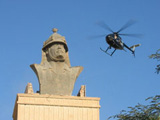The Future of Private Forces
12 Jan 2011
By Jody Ray Bennett for ISN
A recent report from external pageProPublicacall_made, based on analysis of US Department of Labor statistics, showed that "more private contractors than soldiers were killed in Iraq and Afghanistan in recent months," making 2010 the "first time in history that corporate casualties have outweighed military losses on America's battlefields."
The swelling numbers of contractor deaths could only result from the greatest foreign policy experiment in privatization in US history. These numbers call for a closer look at the changing role of private force and its impact on the industry.
Damage control
For years the private military and security industry has dealt with a troubled, tarnished image resulting from several high-profile abuses perpetrated in Iraq and Afghanistan over the last decade. As Blackwater quickly became the most recognized and controversial name in the industry, it long ago set out to rebrand its image, external pagechanging its name to Xe Servicescall_made. More recently the entire industry appears to have felt the need for a new marketing strategy. For example, the industry's trade union and lobbying group, the International Peace Operations Association (IPOA), external pagechanged its namecall_made to the International Stability Operations Association (external pageISOAcall_made).
Further, 60 private security companies - external pageBlackwatercall_made included - external pagesignedcall_made a global Code of Conduct (COC) in Geneva last November, pledging to "curb their use of force, vet and train personnel, and report any breaches [of contract]." But even this prompted the criticism that the COC was merely symbolic, arriving nine years too late. For others, however: better late than never.
"[The Code of Conduct] could be meaningful, but if only the language is written into all contracts issued by member state governments. In the case of the United States it would mean inserting the COC language into the Federal Acquisition Regulations (FAR) and DFAR (Defense Federal Acquisition Regulations)," industry analyst and author of Shadow Force: Private Security Contractors in Iraq, external pageDavid Isenbergcall_made told ISN Insights.
"This is a really important step, and one that I have supported from its inception (and before). It was made possible, in part, by a convergence among a wide array of actors on the idea of regulation and the need for more of it. It used to be that people opposed PMSCs for what they were; now they are more interested in what they do. The Code of Conduct is the first step in stipulating appropriate behavior," explained professor of political science and director of external pageInternational Studiescall_made at UC Irvine, Deborah Avant.
'One nation under contract'
Despite the creation of the COC and the external pagerecent sale of Blackwatercall_made, hundreds of PMSCs remain operational around the globe. And even as US President Barack Obama has pulled American troops from Iraq, thousands of contractorsremain (or even find new business opportunities there). These companies will always be looking for the next opportunity.
"Industry is always looking for new business, regardless of what happens in Iraq. It has been years since the bursting of the Baghdad bubble for PSCs in Iraq. The biggest change is that the majority of PSCs in Iraq in the future will be working for the State Department and not the Pentagon," Isenberg told ISN Insights.
"They have already expanded. To paraphrase the old Virginia Slims cigarette commercial, 'they are not your Daddy's PMC'. Private contractors are working for intelligence, homeland security, foreign aid, border patrol, cyber security and immigration," he added.
external pageAllison Stangercall_made explained part of the reason for PMSCs' expansion duringexternal pagean event held by the Carnegie Councilcall_made last October, entitled One Nation Under Contract: The Outsourcing of American Power and the Future of Foreign Policy:
The size of the Executive Branch work force in 2008 - that is, the federal work force -is the same size as it was in 1963. Yet, the federal budget in that same period of time has more than tripled, adjusted for inflation, and the population has doubled. That enormous gap, in part, is filled by contractors. A firm like Lockheed Martin is today doing more than servicing weapon systems. It also sorts your mail, tallies up your taxes, cuts Social Security checks, counts people for the US Census, runs space flights, and monitors air traffic.
That we have become one nation under contract means that there is no longer any vigorous and disinterested government to turn to for help. The business of government is increasingly in private hands.
And the same logic seems to hold true for armed contractors working in Iraq and Afghanistan.
"[PMSCs] are already evolved from the days of external pageExecutive Outcomes (EO) and Sandlinecall_made to the more corporate and government approved Blackwater, Triple Canopy, Dyncorp, Armor Group, etc. The key difference between the days of EO and now is that governments embrace PMCs. It is not well remembered that EO was actually working in places like Angola and Sierra Leone, despite the opposition of the South African government," Isenberg explained.
Despite harsh criticism, private forces will remain viable and active well into the future. In fact, in late December 2010, the US Army external pageannounced it would awardcall_made $1.6 billion to a private security firm to train an Afghan police force. This speaks not only to the overwhelming and seemingly ubiquitous era of the private corporation, but the resilience of the private military and security industry to withstand its detractors and capture the interest of governments to execute their foreign policies.
"PMSCs are ever changing; that is the whole idea - flexibility. Companies can easily morph to do all kinds of things (aid, development, homeland security). That flexibility poses some serious hurdles to effective regulation, but regulators also need to be flexible. Someone needs to know about what industry personnel are doing, and they also need to know enough to distinguish between good and bad behavior," Avant warned.

